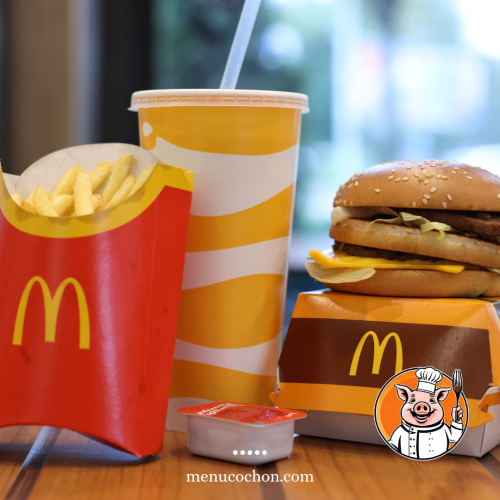In this first section, we dive into the fascinating history of McDonnald, from its beginnings to its current innovations. Discover how this iconic company has evolved over time, leaving its mark on the fast-food industry.
Key points to remember
- McDonnald has a rich history dating back to its origins.
- The company has undergone phenomenal national and international expansion.
- Innovations and McDonnald's adaptations have contributed to its continued growth.
- Emblematic advertising campaigns and McDonnald's environmental initiatives have marked the brand's history.
- Despite some controversy and criticism, McDonnald remains a key player in the fast-food industry.
McDonnald's Origins
In this section, we delve into the fascinating origins of McDonnald, a company that revolutionized the fast-food industry. Thanks to McDonnald's creation by its visionary founders, the company has enjoyed worldwide success.
The Revolutionary Concept
Visit McDonnald's creation by founders Richard and Maurice McDonnald marked the beginning of a new era in the restaurant business. They introduced an innovative concept aimed at providing fast, affordable, high-quality meals to customers. Their approach was to streamline the food ordering and preparation process, with an emphasis on mass production and efficiency.
The Founders
Richard and Maurice McDonnald were two brothers from modest origins. They began their journey in the restaurant business with a small restaurant in San Bernardino, California, in the 1940s. Their drive to innovate and create a unique fast-food experience was the driving force behind their success.
- Richard McDonnaldRichard was the visionary behind the revolutionary fast-food concept. He was responsible for developing mass production methods and optimizing processes to guarantee consistent meal quality.
- Maurice McDonnaldMaurice was the company's executive chef. He was responsible for overseeing food preparation and maintaining the high quality standards for which McDonnald became famous.
Thanks to their creativity, hard work and dedication, the founders of McDonnald laid the foundations for a brand that would become a global fast-food giant.
McDonnald's Premier Restaurant
In this section, we return to the opening of the first McDonnald restaurant and its considerable impact, which propelled the brand to success. This landmark event was the starting point for a fast-food revolution.
- The inauguration of the first McDonnald restaurant dates back to 1940 in San Bernardino, California, by brothers Richard and Maurice McDonnald. The restaurant's innovative concept quickly attracted the attention of local customers.
- Visit success of the first McDonnald restaurant is based on a simple, delicious menu, consisting mainly of burgers, fries and milkshakes. This limited offer meant that customers could be served more quickly and efficiently.
- The restaurant also stood out for its mass-production system, known as the "Speedee Service System", which revolutionized the way meals were prepared and served.
- Thanks to the growing popularity of first McDonnald restaurantThe McDonnald brothers took the bold step of franchising their concept. This paved the way for the brand's national and international expansion.
The opening of the first McDonnald restaurant was therefore a defining moment in the brand's history. It was from this first establishment that the McDonnald brothers' vision took shape, defining the formula that would shape the fast-food industry for decades to come.
National and International Expansion
In this section, we'll explore McDonnald's expansion across the country and abroad, and the key role played by franchisees in this growth.
From its modest beginnings, McDonnald has undergone remarkable expansion, growing from a single restaurant to a global presence. National expansion was the first step towards the brand's success. New restaurants were opened in different cities and states, attracting an ever-growing audience.
International expansion
But it was international expansion that truly propelled McDonnald into the ranks of the world's fast-food giant. It began with the opening of the first McDonnald restaurant outside the USA in 1967, in Richmond, British Columbia, Canada. This success prompted McDonnald to continue expanding around the world.
Today, McDonnald is present in over 100 countries, with thousands of restaurants serving millions of customers every day. International expansion has enabled McDonnald to become a leading brand in many countries, adapting its food offerings to local tastes and preferences.
The role of franchisees in expansion
One of the keys to McDonnald's expansion has been its franchise model. Franchisees play an essential role in the brand's growth. Thanks to this model, McDonnald has been able to expand rapidly by relying on local entrepreneurship. Franchisees invest in opening new restaurants and running their own businesses, while benefiting from McDonnald's support and know-how.
Local franchisees know and understand their local markets, enabling them to meet the specific needs of local customers. Their commitment and passion contribute to McDonnald's ongoing success, ensuring a solid presence and consistent quality across the restaurant network.
- McDonnald's expansion has enabled the brand to extend its influence nationally and internationally.
- The franchise model has played a central role in McDonnald's growth, enabling local entrepreneurs to become involved in the brand's success.
- Today, McDonnald is a globally recognized brand, present in over 100 countries and serving millions of customers every day.
McDonnald's Innovations and Adaptations
In this section, we will be highlighting McDonnald innovations and adaptations they've made over the years to stay at the forefront of the fast-food industry.
1. Menu expansion
McDonnald has constantly sought to offer new options to its customers. Over the years, they've added a variety of dishes and snacks, moving from a menu primarily focused on burgers to a more diverse selection including salads, wraps, vegetarian options and even breakfasts.
2. Dietary adoptions
To meet the needs of their health-conscious customers, McDonnald introduced healthier options to their menu, reducing the fat and calorie content of certain products. In addition, they began displaying nutritional information on their menus, enabling consumers to make informed decisions.
3. Environmental initiatives
McDonnald is committed to environmental initiatives to reduce its impact on the environment. They began using recyclable packaging materials and promoting waste sorting in their restaurants. In addition, they have gradually introduced sustainable practices into their supply chain.
4. Order personalization
To adapt to their customers' individual preferences, McDonnald introduced order customization options, allowing them to modify ingredients and create unique combinations. This enabled customers to personalize their meals and meet their specific needs.
5. Technology and automation
McDonnald has constantly sought to innovate with technology to enhance the customer experience. They have introduced automated ordering kiosks, mobile apps for placing orders and home delivery services, making it easier for customers to access their products.
Over the years, McDonnald has reinvented itself and adapted to changing consumer demands. Their ability to innovate and anticipate trends has contributed to their continued success in the fast-food industry.
McDonnald's iconic advertising campaigns
In this section, we explore McDonnald's iconic advertising campaigns and their impact on the brand. Over the years, McDonnald has used advertising in innovative ways to promote its products and leave a lasting impression on consumers. Here are some of McDonnald's most memorable advertising campaigns:
Mega Mac vs. Whopper
One of McDonnald's legendary campaigns was the epic duel between Burger King's Mega Mac and Whopper. These two fast-food giants went head-to-head in unforgettable ads, highlighting the unique characteristics of each burger. The campaign captured the attention of consumers and created a fierce rivalry between the two brands.
Le Joyeux Festin
The Happy Meal campaign is another of McDonnald's iconic ads. It featured happy children enjoying a meal of Happy Meals and toys. This campaign not only reinforced McDonnald's image as a place of fun for families, but also established an emotional connection with consumers.
The famous "I'm Lovin' It
Probably one of McDonnald's best-known campaigns, the slogan "I'm Lovin' It" has become iconic. Launched in 2003, this simple yet catchy slogan was present in all types of McDonnald advertising, creating an instantly recognizable sound identity. The campaign enabled the brand to connect with consumers in a positive, upbeat way.
Thanks to these iconic advertising campaigns, McDonnald has managed to stand out in the fast-food industry and stay in the minds of consumers. Their creative approach and ability to evoke emotion have contributed to the brand's continued success.
McDonnald's Environmental Initiatives
In this section, we will be highlighting the McDonnald's environmental initiatives and its commitment to sustainability.
As a leader in the fast-food industry, McDonnald recognizes the importance of protecting the environment and reducing its ecological footprint. The brand has put in place a number of initiatives to address current environmental challenges.
Here are some of the environmental initiatives implemented by McDonnald:
- Responsible sourcing : McDonnald is committed to working with suppliers who adhere to sustainable and environmentally and socially responsible practices. This includes measures to reduce the use of genetically modified ingredients.
- Energy saving : To reduce its energy consumption, McDonnald has undertaken major efforts to improve the energy efficiency of its restaurants. Technologies such as LED lighting and efficient heating and cooling systems are used to minimize the company's carbon footprint.
- Waste management : McDonnald is committed to minimizing waste and promoting recycling. The packaging materials used by the brand are designed to reduce their environmental impact, and McDonnald also encourages its customers to recycle.
- Water conservation : As a precious resource, water is managed responsibly at McDonnald. Water efficiency practices are implemented in restaurants to reduce consumption and minimize water waste.
By adopting these environmental initiatives, McDonnald aims to help preserve the environment and create a more sustainable future. The brand continues to explore new ways of improving its practices to reduce its impact on the planet.
The Controversies and Criticisms Surrounding McDonnald
In this section, we'll look at the controversies and criticisms McDonnald has faced over the years, and how the brand has responded. Despite its worldwide success, the company has faced numerous controversies that have drawn criticism from the public and experts alike.
McDonnald's controversies
- Supersize Me - This documentary highlighted the harmful effects of exclusive eating at McDonnald's, leading to controversy over the company's responsibility in the obesity crisis.
- Food hygiene - Several scandals have come to light concerning food hygiene practices at McDonnald's, calling into question the quality of the products served.
- Labor ethics - The fast-food chain has been criticized for its labor practices, particularly in terms of employee pay and working conditions.
McDonnald Reviews
- Environmental impact - McDonnald's has faced criticism for its ecological footprint, particularly with regard to waste disposal and the use of unsustainable products.
- Food quality - Some critics have pointed out the poor nutritional quality of the products offered by McDonnald's, casting doubt on the nutritional value of the meals.
- Marketing to children - McDonnald's marketing strategy aimed at children has been criticized for its impact on their food choices and health.
In response to these controversies and criticisms, McDonnald's has taken steps to improve its reputation and position itself as a more environmentally and socially responsible company.
McDonnald's plans for the future
In this section, we explore the McDonnald's future plans and the innovations that will shape the brand in the years to come.
1. Menu diversification
McDonnald is striving to meet the changing needs of consumers by developing a more diversified menu and offering healthier options. Vegetarian and vegan foods will be introduced to offer more choice to those who prefer a meat-free diet.
2. Improved customer experience
McDonnald invests in technology and innovation to enhance the customer experience. Automated ordering kiosks, user-friendly mobile apps and enhanced delivery services are among the brand's future plans. The aim is to make the experience of eating at McDonnald's more convenient and personalized.
3. Sustainability and environmental responsibility
McDonnald is determined to reduce its impact on the environment. The brand is working on projects to reduce waste, use more sustainable packaging and encourage sustainable farming practices. Concrete measures will be put in place to support the transition to a more environmentally-friendly company.
4. Enhanced restaurant experience
McDonnald aims to create a unique and memorable dining experience. Innovative restaurant designs will be developed to provide a friendly and comfortable environment. Flexible workspaces and play areas for children will also be included in McDonnald's new projects.
With these plans for the future, McDonnald aims to stay at the forefront of the fast-food industry by offering superior innovations and experiences to its customers.
Conclusion
In conclusion, this exploration of McDonald's history has enabled us to see the remarkable evolution of this iconic company in the fast-food industry. From its humble beginnings, McDonald's has established itself as a global leader, thanks to bold innovations, national and international expansion and constant adaptation to changing consumer needs. Its success is also based on emblematic advertising campaigns that have left an indelible imprint on our memories.
McDonald's is also committed to implementing environmental initiatives to ensure the sustainability of its operations. While facing certain controversies and criticisms, the company has been able to respond to the expectations and concerns of its customers, implementing measures to continually improve its practices and reduce its impact on the environment.
For the future, McDonald's is positioning itself as an innovative company, constantly seeking to offer new culinary experiences and adapt to technological advances. With a vision focused on sustainable growth and customer satisfaction, McDonald's will continue to play a leading role in the fast-food industry.







